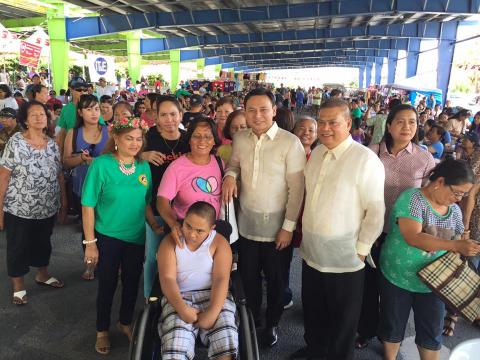
(file photo: Senator Sonny Angara with kababayans in Saipan)
Reelectionist Senator Sonny Angara is looking forward to having more social welfare attachés (SWAs) in Philippine embassies and consulates, especially in countries with high concentration of overseas Filipino workers (OFWs), once the bill seeking to institutionalize their deployment abroad is signed into law by President Rodrigo Duterte.
The enrolled copy of the measure establishing the Office for Social Welfare Attaché has already been transmitted to Malacañang for the President’s signature. Angara is one of the bill’s authors in the Senate.
Angara said the deployment of more SWAs abroad is expected to fill the gap when it comes to comforting OFWs in distress and needing psychological services, such as victims of trafficking, illegal recruitment, sexual abuse and maltreatment.
“Having ‘malasakit officers’ in Philippine embassies and consulates is a reassurance that the government truly cares for our modern-day heroes, who sacrifice a lot to create better lives for their families and help the Philippine economy to stay afloat through their remittances,” said Angara, who is scheduled to campaign today in Batangas province, which belongs to the region with the highest number of OFWs.
In 2017, data from the Philippine Statistics Authority showed that 2.34 million Filipinos left the country to work abroad, around 20.7 percent or roughly 484,000 of them are from Region 4-A or Calabarzon. Unofficial estimates, however, showed that there are 10 million Filipinos living and working overseas.
But despite the huge number of OFWs scattered globally, Angara lamented that the country has only 7 SWAs who are currently deployed in Malaysia, Kuwait, Qatar, Hong Kong, Dubai, and Jeddah and Riyadh in Saudi Arabia.
Even if the government plans to deploy SWAs in Abu Dhabi, Jordan, Lebanon, Italy and South Korea this year, their number is not enough to attend to all OFWs who are vulnerable to extreme physical, emotional and psychological stress.
“In the division of labor inside what is basically a multi-agency embassy, there are assigned personnel that can handle legal cases, liaise with local police, as well as military, trade, agriculture attachés,” Angara said.
He pointed out that what is lacking is a trained professional who can provide the three essential C’s—care, comfort and counseling—to Filipinos in crisis situation and in need of special protection.
"Kahit meron tayong magagaling na abogado sa mga embahada at batikang eksperto sa lokal na regulasyon, ang isang kakulangan ay ‘yung magbibigay ng psychosocial care doon sa mga biktima ng trafficking or violence," Angara said.
“Traumatized Filipinos require the services of a trained professional. Kung ang isang OFW ay biktima ng sexual abuse, ‘yung pagtulong sa kanila ay nangangailangan ng isang specialist and this is the kind of skill-set that might not be found in the organizational setup of an embassy,” he added.
Once the bill creating the Office for Social Welfare Attaché is enacted, the Department of Social Welfare and Development (DSWD) will formulate and issue the implementing rules and regulations, in coordination with the Department of Foreign Affairs, the Department of Labor and Employment, the Department of Health, the Philippine Overseas Employment Administration, the Overseas Workers Welfare Administration, and the Commission on Filipinos Overseas.
The DSWD is also tasked to provide criteria for determining the selection of diplomatic posts to which SWAs will be deployed and the minimum qualifications and attributes of the SWA.
Under the 2018 and 2019 national budget, a total of P90 million is allocated for the Office of the Social Welfare Attaché.
